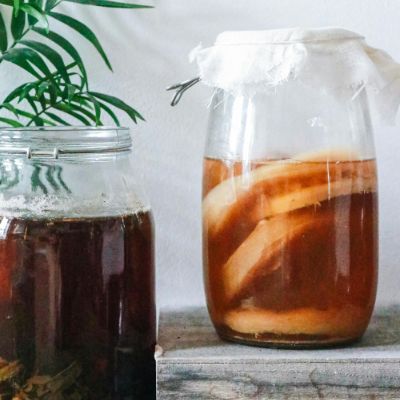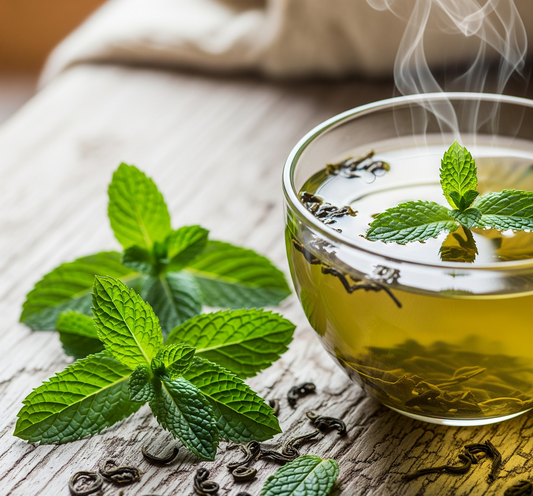This content provides an in-depth look at the role of tea, especially black tea, in making kombucha. It highlights the importance of using high-quality, organic black tea varieties like Assam, Darjeeling, and Ceylon, which offer robust flavors, tannins, and caffeine to support the kombucha fermentation process. The content also recommends ABC Company's Kanchanjangha Noir as an excellent black tea choice. It outlines the step-by-step process of making kombucha using black tea, from brewing the tea to bottling the final product. Additionally, the content addresses common questions about kombucha, such as its alcohol and caffeine content. Overall, the guide emphasizes the crucial role of premium black tea in brewing delicious and healthy homemade kombucha.
Go to comment (1)If you’ve landed on this page, there's a high chance that you’ve recently tried kombucha, maybe multiple times, and have fallen in love with its fizzy, tart, and just shy of sweet taste. And now, you’re looking to brew a few bottles yourself.
This fermented drink has gained popularity on a global scale in recent years due to its unique taste and supposed health benefits. But did you know that the base of this wonder drink is usually black or green tea? Amazing, right? Let’s take a look into how you can brew this refreshing probiotic drink using just tea from the comfort of your home. We’ll also answer some of the most burning questions you might have about kombucha, like whether there’s any truth to the saying that kombucha has alcohol and whether kombucha has caffeine.
What is Kombucha?

Before we get into what tea you need to use to make kombucha, let’s first understand what this drink is in the first place! In short, kombucha is a fermented tea drink made using sweetened tea with a symbiotic culture of bacteria and yeast, or just SCOBY for short. This jelly-like substance transforms the tea into the tangy and fizzy beverage we all love so much.
In recent days, brewers have also started adding various fruit extracts to create new and exciting flavors to stand out among their contemporaries. Given its generally easy preparation process, kombucha has reached almost every part of the globe.
The Role of Tea in Making Kombucha
Tea plays an important role in making kombucha. It provides all the essential nutrients and compounds like caffeine and tannins to the SCOBY to ferment the sweet tea and create this tangy and fizzy probiotic beverage.
It is common for brewers to use black tea to make kombucha, given its robust flavor and rich levels of tannins. While green tea is also used for its lighter taste and different antioxidants, herbal tea is used to bring out unique flavor profiles.
Why use Black Tea for Kombucha
When you’re selecting tea to make your kombucha, make sure that you opt for high-quality, organic black tea. Organic black tea is grown in a natural setting without the use of any pesticides and chemicals, this means that the SCOBY can remain healthy and go about its job without any hiccups. This compatibility also means that the SCOBY can produce consistent batches.
Black tea stands out among its contemporaries for its robust flavors and is rich in nutrients like polyphenols and antioxidants. It also has a light caffeine content that is just enough to offer a mild energy boost.

The rich and robust taste that black tea is known for also perfectly complements the kombucha’s tangy and complex taste. This does not mean that you can’t use green or white tea to brew kombucha. You might need to adjust the portions or add additional flavoring due to their milder flavor profiles.
While experimenting with different teas can produce a varied range of kombucha flavors, black tea stands out as a popular choice among home brewers for its robust flavors and nutritional benefits.
To make the selection process easier for you and help you with your decision, we’ve listed some of our top picks of black tea varieties for you.
Kanchanjangha Noir: First on our list, we recommend our very own Kanchanjangha Noir. Rich in dark chocolate, raisins, and cherry flavor notes, our tea makes the perfect companion to the kombucha SCOBY.
Brew your very own batch of delicious kombucha with our Kanchanjhangha Noir (Special Black Tea) today!
Assam Tea: One of the best choices for making kombucha, Assam black tea is known for its rich and malty flavor profiles that complement the tangy and fizzy flavor profiles of the kombucha. The robust flavors add a dab of sophistication to the drink creating a satisfying beverage to sip on during a hot and humid day.
Darjeeling Tea: Another popular black tea option is the always-reliable Darjeeling tea. Known for its light aroma and muscatel flavor that’s similar to Blanc à Petits Grains, Darjeeling tea adds a distinct fruity flavor profile to your kombucha.
Ceylon Tea: Ceylon black tea has slowly and steadily been climbing up the ladder for black teas that can be used to make kombucha. With a bright and coppery tan and a refreshing taste, this black tea is a popular choice in the contemporary kombucha brewing scene.
Process of Making Kombucha Using Black Tea
Ingredients: Collect black tea bags (around 4-6 for a one-gallon batch), sugar or sweetener (1 cup per gallon), a SCOBY (Symbiotic Culture Of Bacteria and Yeast), and a starter tea from a previous batch.
Brew Tea: Boil a pan of water and steep the black tea bags for 5-7 minutes. Now remove the tea bags and add the sugar. Stir the sugar until it dissolves. Turn the burner off and let the tea cool to room temperature.
Fermentation: Pour the cooled tea into a clean jar. Make sure to not fill the liquor up to the brim. Add the SCOBY and starter tea. Now cover the jar with a cloth and tie it around the edges with a rubber band or rope.
Ferment: Place the jar in a warm and dark place for one to two weeks. Make sure to taste the kombucha periodically to check for the desired tartness.
Bottle: Once you feel like the kombucha has attained your preferred taste, remove the SCOBY and remove some starter tea for the next batch. Bottle the kombucha in airtight containers. Feel free to add flavoring if desired.
Carbonation: Now let the bottled kombucha sit at room temperature for 3 - 4 days to carbonate.
Enjoy the kombucha: You can refrigerate the kombucha to stop the fermentation. Enjoy your delicious and refreshing homemade, probiotic black tea kombucha.
Does Kombucha Have Alcohol?
One of the most frequently asked questions about kombucha is whether this drink has any alcohol content. The simple answer is, “Yes, it does!”. However, it’s a very low amount, typically less than 1% to be more precise. Furthermore, home-brewed kombucha can have even lower amounts of alcohol. This amount makes it a non-alcoholic beverage.
The reason why kombucha has alcohol content is because of the fermentation process that the liquid has to go through to transform into this wonder drink. You can even further lower the alcohol content by lowering the fermentation time.
Does Kombucha Have Caffeine?
A common question about kombucha is whether it contains caffeine. The answer depends on the tea used during fermentation. If you use caffeinated tea (like black, green, or oolong), then yes, your kombucha will have some caffeine. However, if you opt for herbal teas (which are caffeine-free), your kombucha will be caffeine-free as well.
Yes, kombucha contains caffeine, as it's made from tea. However, the caffeine content decreases during fermentation due to the SCOBY's metabolism. A typical 8-ounce serving of kombucha contains about 10-25 mg of caffeine, compared to 40-70 mg in a cup of black tea.





How to Make Kombucha Using Tea: A Tutorial
Comment (1)
First time hearing about this sort of drink a few days ago, my question is why is ‘starter’ tea from a previous batch needed?
I’m very interested in this drink as I’ve heard it’s good for gut health and as a rheumatoid arthritis sufferer(sp!), I hear it also reduces inflammation…..